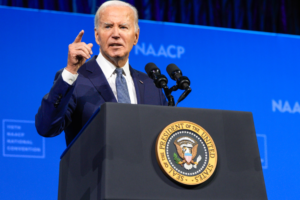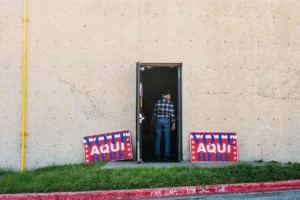A 5th U.S. Circuit Court of Appeals panel in New Orleans heard oral arguments Wednesday for an appeal to overturn a judge’s order that Llano County officials return to shelves books they had removed. It was not clear how or when the appellate panel would rule.
A federal appeals judge said Wednesday if two particular young adult books “don’t meet the definition of pornography, I don’t know what does,” before clarifying he meant “obscenity” during a hearing over the removal of certain books from a Central Texas public library.
Judge Kyle Duncan, who was appointed by former President Donald Trump, made the remark while serving on a 5th U.S. Circuit Court of Appeals panel, which heard oral arguments for an appeal to overturn a judge’s order that Llano County officials return to shelves books that they had removed for purportedly not being age-appropriate for younger readers.
Other judges on the panel joined in questioning lawyers from both sides about the basis of their argument and the legal precedent that informed them.
The courtroom arguments were the latest battle in a war against certain books — mostly those that explore themes of race and sexuality — that has swept across the country, often led by Republican elected officials.
The Llano case has slowly unfolded and could potentially serve as a test of how the courts treat protections for libraries and librarians amid the trend of book challenges and efforts to ban them.
The ruling and appeal both pertain to a lawsuit that seven patrons of this Central Texas library system filed in April 2022, alleging their First Amendment right to access and receive ideas had been infringed when officials removed books based on their content.
The nearly hourlong hearing Wednesday marked the latest turn in a saga that first began almost two years ago with the removal of 17 books, including one for teens that calls the Ku Klux Klan a terrorist group, Isabel Wilkerson’s “Caste: The Origins of Our Discontents” and a comedic children’s book from Dawn McMillan’s “I Need a New Butt!” series.
It was not clear how or when the judges would rule on the appeal.
Jonathan Mitchell, who is representing the sued county officials and is also the architect of the state’s prohibition on abortions, argued the district judge’s ruling should be overturned for multiple reasons, including that the removed books are available to be checked out through the library’s in-house system and that the plaintiffs are not suffering irreparable injury because the books are available. Further, Mitchell said the librarian who had removed books did not do so with viewpoint discrimination.
“The plaintiffs, to be sure, would prefer for the books to be returned to the library shelves. But the First Amendment does not give library patrons a right to demand that books be stored in a particular location in the library, so long as the books remain available to the plaintiffs who are suing,” Mitchell said. “As long as the plaintiffs remain capable of accessing and obtaining each of these 17 books, and no one disputes that they are, they cannot possibly show that there is an ongoing violation of their constitutional rights.”
Katherine Chiarello, one of the lawyers representing the library patrons, focused on the motivation of the librarian who removed the books, arguing that the district judge found the defendants’ removal of the 17 books originated from officials in Llano County disliking the ideas contained in them, which is unconstitutional.
The defendants argue that the books were removed during a regular process of checking library shelves, a process called weeding. Further, they say the books are available upon request.
At one point during the hearing, Duncan, one of the judges, posed a hypothetical scenario to Chiarello: If white supremacist David Duke put his autobiography on library shelves, could a public library not remove the book?
Chiarello, explaining the legal precedent she was leaning on, said that if the book was already in the library, selected by a librarian, and “the substantial motivation for the removal is disagreement with the ideas, then yes, Your Honor, that’s unconstitutional.”
“It doesn’t matter that you and I are offended by that book — it can’t be removed because of that disagreement,” Chiarello said. “There are other things that librarians can do.”
While some of the contested books dealt with themes of race and sexuality, others covered lighter themes, like farting.
Moving away from a hypothetical scenario, Duncan brought up one of the farting books in question in Llano — saying “I never foresaw myself saying these words in the august courtroom of the Fifth Circuit.” In that case, he said, the librarian removed the book, which some patrons did not want. He asked if that was a First Amendment violation.
Chiarello said yes, if it was removed because the government disagreed with the viewpoints in the book.
Minutes later, Duncan said the books in question were not just about farting and butts but also content that had been called “pornographic filth” by defendants.
“The first question is, I mean, on its face, why is removing pornography from a library an impermissible motive under the First Amendment?” Duncan asked. “Surely, a library — if it discovers it has pornography, whether that be on the shelves or on the internet — can remove it.”
Chiarello said she agreed, but noted there would be no problem if the material had passed a legal test typically used to determine whether something is obscene, which did not appear to have been applied in Llano. Duncan responded that the evidence he was pointing to concerned the content in the books “Lawn Boy” and “Gender Queer.”
“Lawn Boy” is about a pre-teen’s experience with oral sex, Duncan said. “Seems obscene.”
The book, by Jonathan Evison, is a coming-of-age novel that has been targeted frequently for scenes that opponents call pornography. Literacy advocates and educators say such books serve an important role for marginalized students who may not see their lived experiences depicted in other literature.
Neither Chiarello or Mitchell immediately responded to emails from The Texas Tribune seeking comment.
Following the district court ruling in March, Llano county officials briefly contemplated shutting down the library system but did not after hearing from a parade of people who opposed the idea.
As the battle has slogged through the courts, some Republican elected officials’ focus on books in libraries has remained fixated. Lawmakers in Texas moved to change how schools stock their library shelves, passing a law that places the onus of identifying sexually explicit books on the businesses selling them to schools.
While supporters of House Bill 900 — including House Speaker Dade Phelan — say it is meant to protect children, librarians and legal experts have worried its language, from Rep. Jared Patterson, R-Frisco, is too vague and broad and some of the requirements will be unrealistic to fulfill — stifling business and ultimately dating and eroding library collections in schools.
Gov. Greg Abbott had not yet signed the bill as of Wednesday afternoon, but unsigned bills automatically become law as long as the governor doesn’t veto them before its deadline.
Source: texastribune










